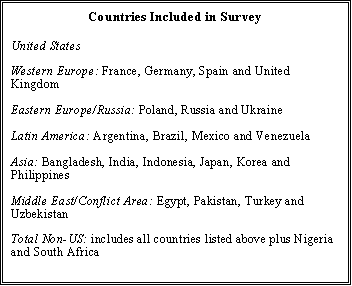Introduction and Summary

Opinion leaders around the world believe that the events of Sept. 11 opened a new chapter in world history, but their views about the United States and its struggle with terrorism reflect a more familiar love-hate relationship with America. Influentials in much of the world, except for Western Europe, see mixed public attitudes toward the war on terrorism. For example, while popular support is reported in most regions of the world, the U.S. is seen as overreacting to the terrorist attacks. Most important, a huge gulf of disagreement exists between American elites and opinion leaders in other parts of the world about the causes of terrorism and the sources of resentment and respect for the U.S.
Commenting on public sentiment in their countries, opinion leaders in most regions say U.S. policies are believed to be a principal cause of the Sept. 11 attack. And majorities in all parts of the world, including Western Europe, say that many or most of the people in their countries think it is good that Americans now know what it is like to be vulnerable.

Asked for their own view, most opinion leaders say they think the U.S. is conducting the war on terrorism without taking into account its allies’ interests. There also is little backing among the 275 political, media, cultural, business and government leaders in 24 countries surveyed by the Pew Research Center and the International Herald Tribune for extending the war to Iraq or Somalia, even if it is shown that these countries have supported terrorism. While half of U.S. opinion leaders would favor expanding the conflict, large majorities in most parts of the world say the war should be confined to Afghanistan.
But reflecting a broad ambivalence toward the United States, a majority of non-U.S. opinion leaders, including nearly half of influentials in Islamic countries, say many or most people in their countries think the U.S. is doing the right thing in fighting terrorism. Moreover, when speaking for themselves, even opinion leaders in Islamic nations say the war against terrorism is worth the risk of destabilizing Muslim states that support the anti-terror coalition.
Few opinion leaders, even in Muslim countries, see popular support for the al Qaeda position and most report at least a moderate degree of public backing for the U.S. More generally, two-thirds of opinion leaders outside the U.S. say ordinary people in their countries have a favorable view of the U.S. The notable exception is the Middle East/conflict area, where roughly half say ordinary people have a negative impression of the U.S.
It should be noted that these are observations that opinion leaders around the world make about people in their countries. A principal objective of the forthcoming Pew Global Attitudes Project will be to test these findings by conducting public opinion surveys in 25 countries over the course of the next year.

American elites see the world image of the U.S. through a different lens than do their counterparts overseas. While they recognize that U.S. power is resented, opinion leaders in the United States believe America’s support of Israel is also a big problem. Not so, say opinion leaders in most other parts of the world, except for those in Islamic nations. Even among leaders in the Middle East/conflict area (Egypt, Turkey, Pakistan and Uzbekistan), U.S. support for Israel is not a bigger factor than are criticisms of the American role in the world.
Along with resentment of U.S. power, the other leading reason that people around the world dislike the United States, according to foreign opinion leaders, is the perception that U.S. policies contribute to the growing gap between rich and poor nations. While acknowledged by some American opinion leaders as well, influentials in most other regions see this as a bigger problem.

Similarly, while American opinion leaders think the U.S. is liked for its good works around the world, fewer than one-in-four leaders in all other regions agree. What U.S. influentials underestimate is the importance of the nation’s role as a technological and scientific leader in bolstering America’s image overseas. Two-thirds of foreign opinion leaders rate this as a major reason why people like the U.S.
The perception of the United States as the land of opportunity is what most opinion leaders both in the United States and overseas see as America’s strong suit. American democratic ideals also are thought to be appealing by majorities of leaders in most parts of the world, with Muslim countries not far behind.
While U.S. support for Israel is not seen as a major factor in why ordinary people dislike the United States, except in Muslim states, a 73% majority of opinion leaders around the world believe the U.S. has been too supportive of Israel. Just 35% of American elites concur. And there is broad consensus among influentials that if the U.S. pressured Israel to create a Palestinian state, terrorism would be reduced 67% of American leaders subscribe to that view, as do 74% of those overseas.
There is little indication that criticisms of the United States by anti-globalization activists hold much sway with people around the world. The growing power of U.S. multinational corporations is not seen as a leading factor in why the U.S. is disliked, except in Western Europe. The spread of American culture through movies, TV and music is at most a minor reason for animosity toward the U.S., according to foreign influentials. Looking forward, few see the sale of American products and the popularity of American entertainment being hurt by the war on terrorism.
When asked directly whether globalization has been a cause of terrorism, pluralities of opinion leaders viewed it as a minor factor at best. Nor is globalization likely to become a casualty of the war. The consensus is that the pace of globalization has barely slowed and even this is seen as a temporary phenomenon by most opinion leaders, in the United States and abroad. This despite the fact that strong majorities see migration, travel and tourism being hurt by the war.

These findings are based on 275 interviews with influential people in politics, media, business, culture and government conducted by the Pew Research Center, Princeton Survey Research Associates and the International Herald Tribune, Nov. 12 to Dec. 13. Almost all interviewing was conducted after the fall of Kabul as the Taliban was in full retreat. Of the 275 interviews, 40 were conducted in the U.S. and approximately 10 were conducted in each of the countries listed. (See Survey Methodology for a fuller description of the survey design.)
This is the inaugural survey of “The Pew Global Attitudes Project,” a series of worldwide public-opinion surveys that will measure the impact of globalization, modernization, rapid technological and cultural change and recent terrorist events on the values and attitudes of 30,000 people in 25 countries worldwide. It will be conducted and released over the coming two years. (See project description.)




